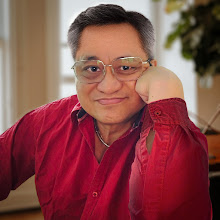
Flowers on the Terraces of the Shrine of the Báb
Photographer: Edit Kalman
Image source: Bahá'í Media Bank
HE IS a black man, born of a Muslim father from East Africa and raised by Christian grandparents in the South Pacific. And today he becomes the first black president of the world's most powerful country, up there in North America.That this is now happening—unthinkable in the earlier years of my generation—is only inevitable in light of America's spiritual destiny. This belief is evident in many talks delivered by 'Abdu'l-Bahá, Son of the Founder of the Bahá'í Faith, while traveling in America and Canada in 1912. In May that year, He told a gathering of Bahá'ís in Cleveland:
"This is a beautiful city; the climate is pleasant; the views are charming. All the cities of America seem to be large and beautiful, and the people appear prosperous. The American continent gives signs and evidences of very great advancement; its future is even more promising, for its influence and illumination are far-reaching, and it will lead all nations spiritually. The flag of freedom and banner of liberty have been unfurled here, but the prosperity and advancement of a city, the happiness and greatness of a country depend upon its hearing and obeying the call of God. The light of reality must shine therein and divine civilization be founded; then the radiance of the Kingdom will be diffused and heavenly influences surround. Material civilization is likened to the body, whereas divine civilization is the spirit in that body. A body not manifesting the spirit is dead; a fruitless tree is worthless. Jesus declares that there is spiritual capacity in some people, for all are not submerged in the sea of materialism. They seek the Divine Spirit; they turn to God; they long for the Kingdom. It is my hope that these revered people present may attain both material and spiritual progress. As they have advanced wonderfully in material degrees, so may they, likewise, advance in spiritual development until the body shall become refined and beautiful through the wealth of spiritual potentiality and efficiency."
Source: "The Promulgation of Universal Peace", page 104
'Abdu'l-Bahá's saw in America "powers and capacities" so unique in this world. He praised the achievements that Americans had made toward creating racial equality, working for world peace, driving women empowerment, and developing its material civilization. His vision: ". . .it will lead all nations spiritually."
To become that spiritual leader, America must itself develop its spiritual capacities. Only then can it become the true leader of nations. Today's event exposes the possibility of racial and religious equality. It shows us another view of the road, possibly rocky but ultimately navigable, to that divine destiny.

